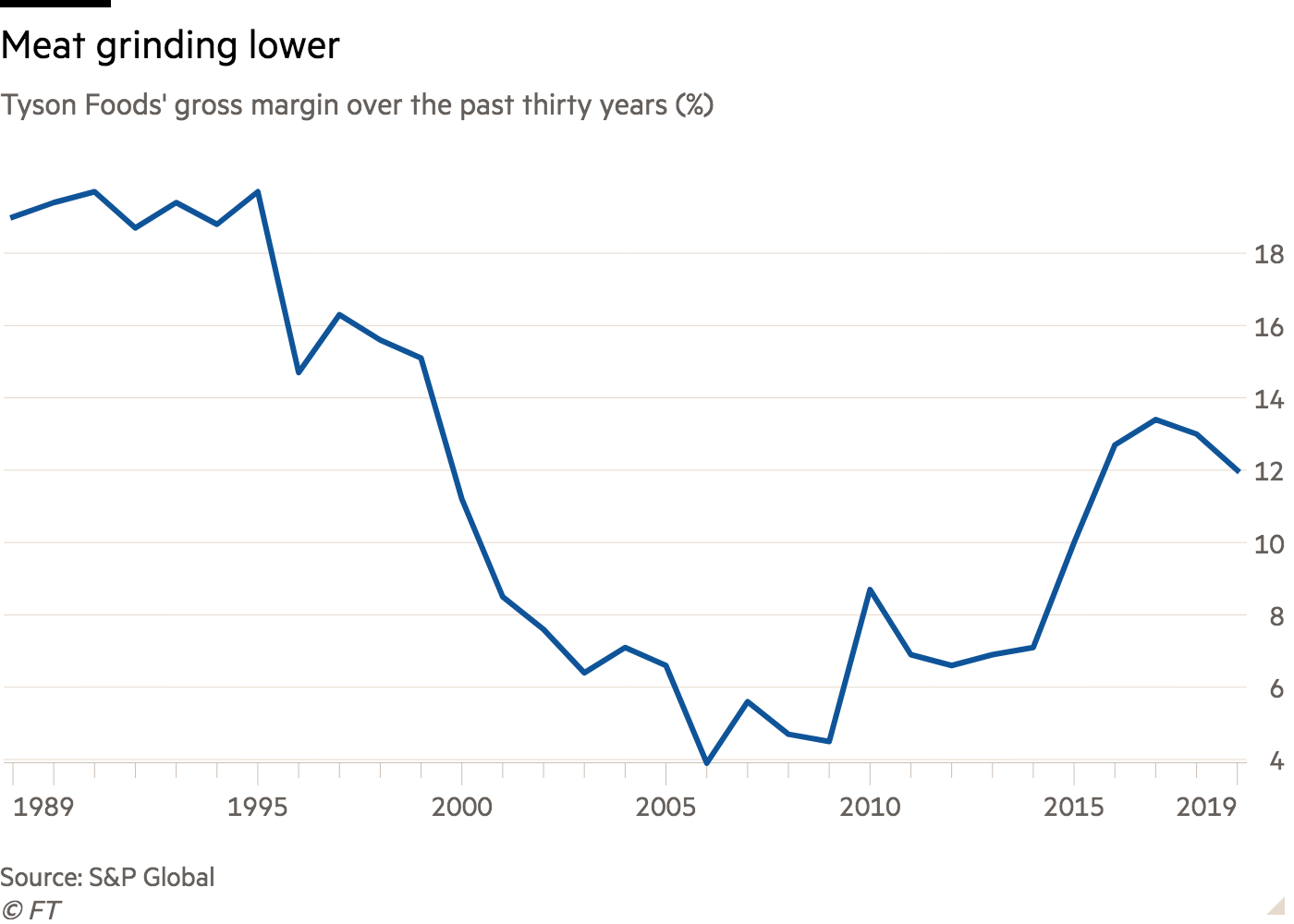Jamie Powell reports in FT Alphaville:
Beyond Meat's revenues rose 141% year-over-year. Coronavirus has sabotaged US agricultural supply chains and production capacity. The food is there, but can not be processed in a timely way or delivered to the parts of the market that need it. Meat shortages present an opportunity for Beyond Meat to grab market share. This is an existential threat for the meat industry regardless of coronavirus. If a company that has barely scaled, and not captured the full production efficiencies, is already twice as profitable as (real meat) been over the past 30 years, that’s a problem.
Beyond Meat, the $7.8bn fake meat company which trades like a penny-stock, announced its first-quarter results.All-in-all, they looked pretty good for the company whose blockbuster IPO confounded many investors. Revenues rose 141 per cent year-over-year to $97m, helping the company achieve a slim profit of $1.8m. It even steam-rolled its rivals post-lockdown, according to chief executive Ethan Brown, who on the ensuing conference call boasted:During this period [Q1], Beyond Meat continued to own the top 4 best-selling SKUs in all plant-based meat and outpaced its closest competitor in terms of year-over-year sales growth by a factor of roughly 6x.Furthermore, during the 4-week period ended March 22, 2020, in which retailers saw stockpiling by consumers as stay-at-home orders proliferated, sales of Beyond Meat products were above 233% year-over-year with velocity growth of 195%, outperforming the plant-based meat category as a whole, which rose 93%.Whether that justifies Beyond Meat’s current valuation of 23 times trailing revenues is for another article (short answer: no), but that’s not what we’re interested in today.The past few weeks have seen a crisis envelop the US meat supply chain. Coronavirus has sabotaged US agricultural supply chains and production capacity. The food is there, but can either not be processed in a timely way or delivered to the parts of the market that need it. It’s got so extreme, that on Wednesday night Donnie from Queens promised to fix the meat shortage at Wendy’s, the American fast-food chain, which has been forced to take burgers off the menu at some locations.Meat shortages present an opportunity for Beyond Meat and its competitors such as Impossible Foods to grab market share. Indeed, Brown said on the call it will look to price competitively over the coming months to lure consumers in.However there’s a reason Beyond Meat can do this: even though it is still in hypergrowth mode, it is already far more profitable on a per-unit basis than its scaled real meat rivals.In the first quarter, Beyond Meat’s gross margin was an astonishing 38.8 per cent. To put that in context, that’s double what $20bn Tyson, the world’s second largest beef, chicken and pork processor, has achieved at peak over the past 30 or so years:Higher gross margins means far more flexibility on pricing. Beyond Meat’s products, in Alphaville’s experience, are often priced a dollar or a pound higher than the meat equivalents in supermarkets. With meat prices rising, and room to cut profitability, that may not last much longer.This, of course, is an existential threat for the meat industry regardless of coronavirus. If a company that has barely scaled, and therefore not captured the full production efficiencies available, is already twice as profitable as you’ve been over the past 30 years, that’s a problem. Particularly when your fixed cost base might not allow you to discount as aggressively to compete.Of course, that doesn’t mean Beyond Meat will be the outright winner here. Economics, in all its infinite wisdom, dictates that high profit margins attract competition. Think of Amazon’s assault on the bookselling world, or how passive investment funds have dragged active management fees down. In the wake of Beyond Meat’s success, Tyson, Kellogg and Nestlé have already waded into the sector over the past year, and many more will follow.Yet as Beyond Meat is over a decade old, it’s therefore likely to have a deep intellectual property base, which may mean imitators fall short on the taste test for some time. (That is, if you like the taste to begin with.)Pricing can also have an effect on brand perception. As a young company driven by extensive research and development, Beyond Meat’s “gee-whizz” factor has somewhat justified its higher price point both in-store and at the fast-food chains serving their products. Whether that remains the case if its pricing falls below a traditional burger patty is a question which we do not have an answer to.For an industry that was barely on investor’s radars two years ago, the fake meat market has suddenly become one of the most fascinating corners of business. Not only because of the obscene valuations (although, at Alphaville, we do love those) but also because of its potential effects on agriculture, the environment and therefore, ultimately, politics. Strap in, it’s only going to weirder from here.


Be a part of the most thrilling online game community Hawkplay
ReplyDelete